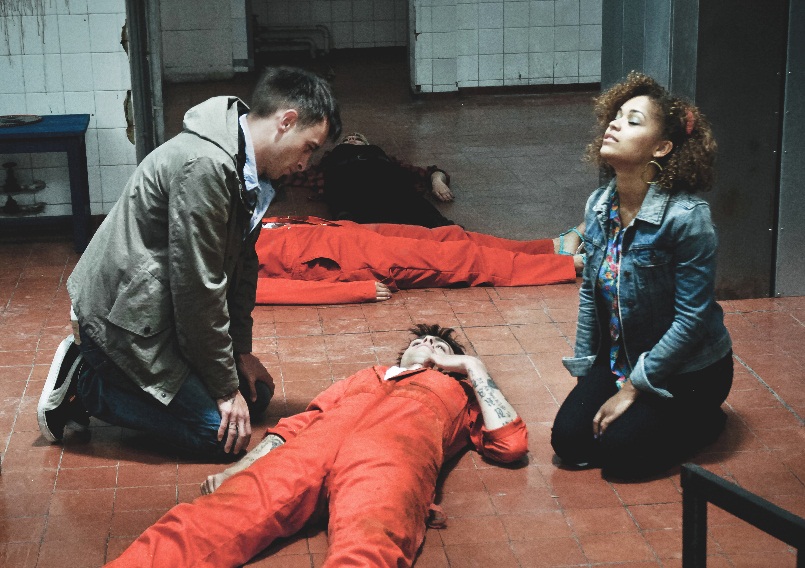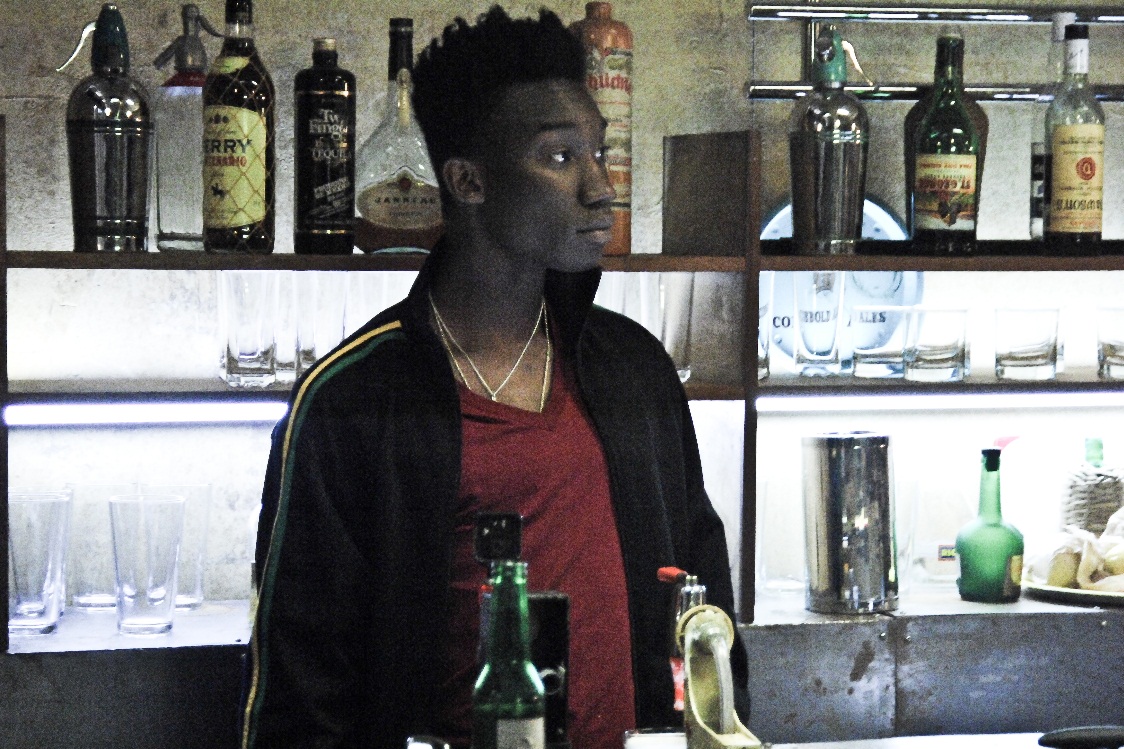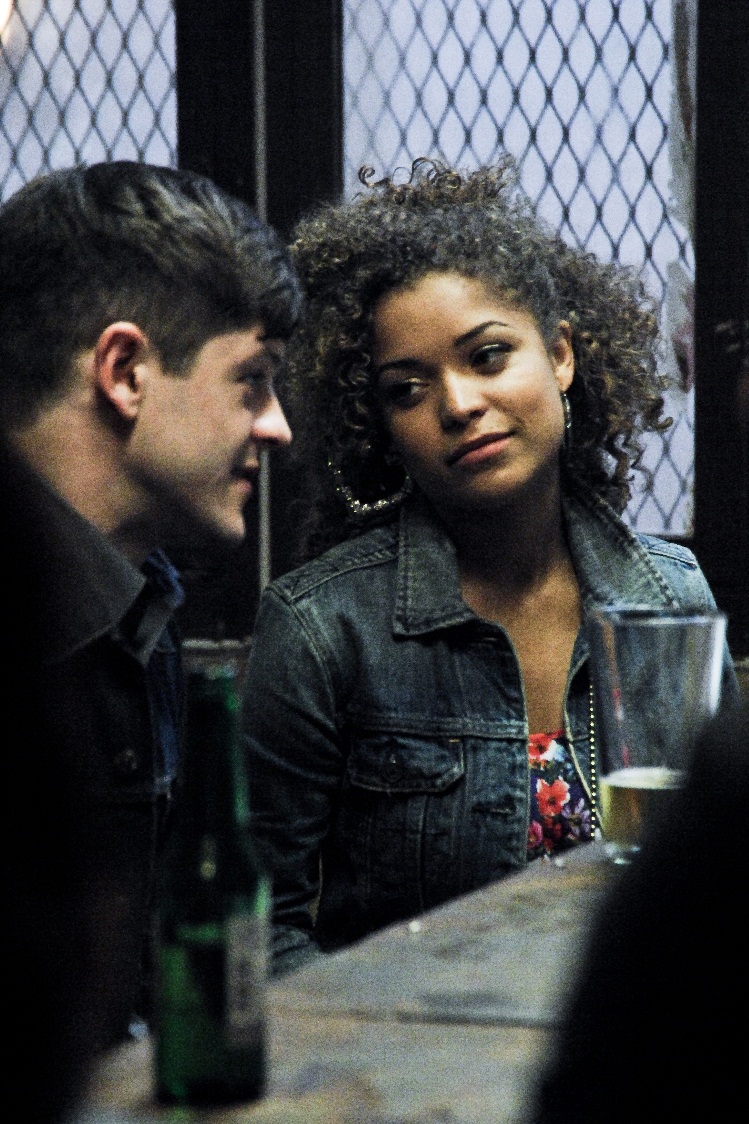
It’s not enough for a show to include all of the best aspects from a vast array of genres; it’s important that they all be balanced appropriately to best complement one another. This is Misfits’ true victory: on the surface, it’s a science-fiction superhero series, using comedy to humanize its characters and situations. But beneath all that, the foundation of the show is its strong layer of character-driven drama. This is what hooked me in the first place.
Misfits opened its first series by setting its five main characters, a collection of ne’er-do-well young adults in a London borough, in community service together. The pilot saw them struck by lightning during a bizarre storm. Over the course of the first series, we’d come to understand that each of them had developed a power – but not before learning about each of them as human beings.
Over the course of the second series, the show began to evolve. With the introduction of the “masked avenger” figure, the science-fiction aspect began to take a stronger role. The idea of the group’s destiny to become heroes earned a larger presence. Where the show was once examining these people on an individual, introspective basis, it was now examining much larger things, like the world around them and how they might find their places in it.
This was a healthy progression for the show. But I’ll admit, I missed the personal stuff. I loved meeting these characters, learning about what makes them tick and the psychological rationale behind the development of their powers. And this analytical and dramatic look at these five aimless, narcissistic young criminals—people who, despite their overwhelmingly flawed personas, we have come to really, really care for—is what made the show so addictive. And the return to that with a new main character, Rudy, is what reinvests my attachment to the series.
Now, don’t get me wrong—I was nervous about the arrival of a new character. First, I was afraid that the third series’ replacement of Nathan with Rudy would prove an unsuccessful attempt to keep us engrossed. After all, replacing the group’s token goofball with a carbon copy would just seem hack. But Rudy is nothing of the sort. From the minute we meet the character in the opening scene of the third series’ premiere, we understand that he’s not genuinely the crass, loudmouthed fool he illustrates himself to be. As demonstrated by his “power” (the ability—rather, the compulsion—to split into two identical bodies), Rudy is a disjointed, deeply troubled individual. And a truly fascinating one.

That said, the third series kicks off in a fairly risky way, focusing on the new rather than the old. The majority of the episode is dedicated to the introduction Rudy, who is played by Joseph Gilgun of the long-running British drama Emmerdale (formerly Emmerdale Farm). Unlike the way in which the rest of the main cast was introduced, we learn about Rudy and his power almost simultaneously—which actually helps a great deal in identifying his character. Rudy opens the episode at the door of the mysterious businessman we met in the Christmas special who can give and take powers to and from the inflicted peoples. Apparently, Rudy is on a quest to rid himself of his troubling ability—the problem is, his ability won’t be removed. Rudy can (and does, involuntarily) split into two identical bodies: from within Rudy springs a second Rudy that embodies the painfully insecure and chronically depressed interior that has plagued him since childhood.
Rudy’s delivery might not be done with the same tact and artistic flow that was attached to that of the rest of the main cast, but this is understandable. We’re already invested in the rest of the group. The premiere has the responsibility of getting us to accept that we like and want to learn more about Rudy, while still paying ample attention to the returning players. The premiere even infuses Rudy into the group through a shared backstory between he and Alisha—not an entirely necessary move, but an economical one. This helps us to understand further why this new character is relevant, all the while developing Alicia’s ever-growing character.
 And for the sake of both fun and urgency, we do get a self-contained villain: a fellow community service worker who feels duped by Rudy when his unhappy interior expresses affection for her moments before she catches the other Rudy locking lips with a different girl. Like many of the villains on the show, this one is not entirely unsympathetic, just emotionally damaged and graced with a particularly harmful outlet for her pain. There’s another great thing about the show: what separates the heroes and villains is such a thin, human line. The villains aren’t really worse people (one might recall all the horrible things Alisha did with her power). We just meet them at very inopportune times—and mostly, these wraths are provoked by one of the “heroes.”
And for the sake of both fun and urgency, we do get a self-contained villain: a fellow community service worker who feels duped by Rudy when his unhappy interior expresses affection for her moments before she catches the other Rudy locking lips with a different girl. Like many of the villains on the show, this one is not entirely unsympathetic, just emotionally damaged and graced with a particularly harmful outlet for her pain. There’s another great thing about the show: what separates the heroes and villains is such a thin, human line. The villains aren’t really worse people (one might recall all the horrible things Alisha did with her power). We just meet them at very inopportune times—and mostly, these wraths are provoked by one of the “heroes.”
And also, presumably, in the name of fun: each of our heroes now has a new superpower, thanks to the aforementioned businessman. They’re interesting powers—Alisha’s especially (I believe she is going to be the breakout star of the third series) reflects a growth in the character and what the show plans to do with her. As her old power represented her manipulative behavior and her investment in her own sexuality, her new power—the ability to see through other people’s eyes—shows that she is growing more empathetic and considerate. There are some interesting connotations attached to Curtis’ gender-swapping ability and Kelly’s new genius-level intelligence. And of course, Simon is still on a mission to become his masked avenger self of the future.
The episode is not entirely without flaw. Curtis seems to have recovered far too quickly from the death of his beloved girlfriend that we witnessed in the Christmas special. Kelly is, so far, attached to no discernible story arc (hopefully they have something meaty in store for her, as she has proven to be one of the most fascinating characters). But all in all, Misfits retains its addictive, multifaceted charm in the face of new cast members, new powers, and new storylines. Things may change and evolve, but the show clearly still understands where its real victory comes from: the dedicated exploration of its characters.
Click here to watch Misfits‘ Series Three premiere on Hulu now!


